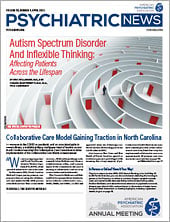The following is the first in a series of articles by members of the APA Committee on the Psychiatric Dimensions of Disaster to enhance members’ awareness and understanding of the role of psychiatrists in disasters and to increase participation by psychiatrists at the district branch (DB) level. In view of the increasing frequency and intensity of disasters, it is critical that all DBs have representatives who are knowledgeable about disaster response to be a resource for that district in the event of a disaster. The articles will also provide links to disaster resources that are available both to APA members and to the public. These resources can assist in developing a level of understanding and comfort that, we hope, will help to motivate psychiatrists to seek more involvement in disaster response.
My first disaster experience occurred in response to Hurricane Hugo in 1989. One member of our medical team was from St. Croix, so a group of us joined in the response for medical care. I had no idea at the time as to how a psychiatrist could be effective in disaster response, but what I learned through that first exposure is that often there are no rules in the immediate aftermath of a disaster. However, as both a physician and a psychiatrist, there are as many ways to provide care as there are individuals who need it.
What, then, is disaster psychiatry? Let’s start by defining “disaster.” According to the World Health Organization, a disaster is a severe disruption—ecological and psychosocial—that greatly exceeds the coping capacity of the community. That’s where we come in: Disaster psychiatry has a broad focus and represents the synthesis of many areas and specialties that include emergency medicine, trauma, community/public health, and general mental health knowledge. Its focus is on populations as well as individuals, treatment as well as prevention, and wellness as well as recovery in the unique setting of a disaster.
Over the past 25 years, the need for psychiatrists to be better trained and knowledgeable about disasters has led to the development of evidence-informed interventions. These include
Psychological First Aid and
Skills for Psychological Recovery. There are also courses, seminars, textbooks, and other resources that offer a level of education and training that allows any interested psychiatrist to become “disaster prepared.” A list of resources appears in the box on the facing page. Residents and fellows are being offered training experiences that open this field to them at a much earlier point in their career.
This year’s Annual Meeting is offering the session “Demystifying Disaster Psychiatry: What Can District Branches Do?,” chaired by Leslie Gise, M.D. The Chronic Cyclical Disasters blueprint will be discussed; it provides a way for behavioral health workers and volunteers to understand what a community is going through and how best to help depending on its foundational issues, chronic and acute stressors, the number of disasters the community has experienced, and at which stage each disaster sits. Participants will be provided scenarios the presenters will discuss to show different ways to utilize the blueprint depending on a community’s unique circumstances.
APA’s Annual Meeting has periodically offered an accredited workshop on disaster psychiatry that in turn has generated additional training opportunities in district branches and residency programs.
Many times, it is not psychiatrists but the survivors who help define our role when a disaster occurs. I was reminded of this 15 years after my first disaster experience. The 2004 Indian Ocean tsunami had just devastated southeast Asia (
Psychiatrist Answers Plea To Help Tsunami Victims). The immediate needs of survivors were initially medical and surgical as people were severely injured and physically compromised by the tsunami. There was a broad-based response to this disaster by the U.S. Navy, the U.S. Public Health Service, and Massachusetts General Hospital. I was invited to join. For me, one encounter in particular has stayed in my mind as a reminder of our value in disasters.
A 50-year-old woman had lost her entire immediate family, much of her extended family, and all of her worldly possessions. She stated, “The life I have lived is over—everyone and everything are gone. Now I need help in starting a new life. ... I have to learn how to keep on living.”
As psychiatrists, we bring a knowledge base to populations and situations requiring our expertise and training for instilling hope and creating options for those who, at that moment, may have lost both.
Unfortunately, disasters are becoming more frequent, intense, and devastating in their impact. They are affecting areas that may never have experienced such an event. The representatives of APA and its district branches are the beacon needed to guide survivors toward their “new life,” whatever it may be. The members of the APA Committee on the Psychiatric Dimensions of Disaster invite you to engage in this profoundly rewarding aspect of our profession by writing to
[email protected]. ■
Resources
Textbook of Disaster Psychiatry by Robert Ursano, M.D., et al. Cambridge University Press, 2017.

